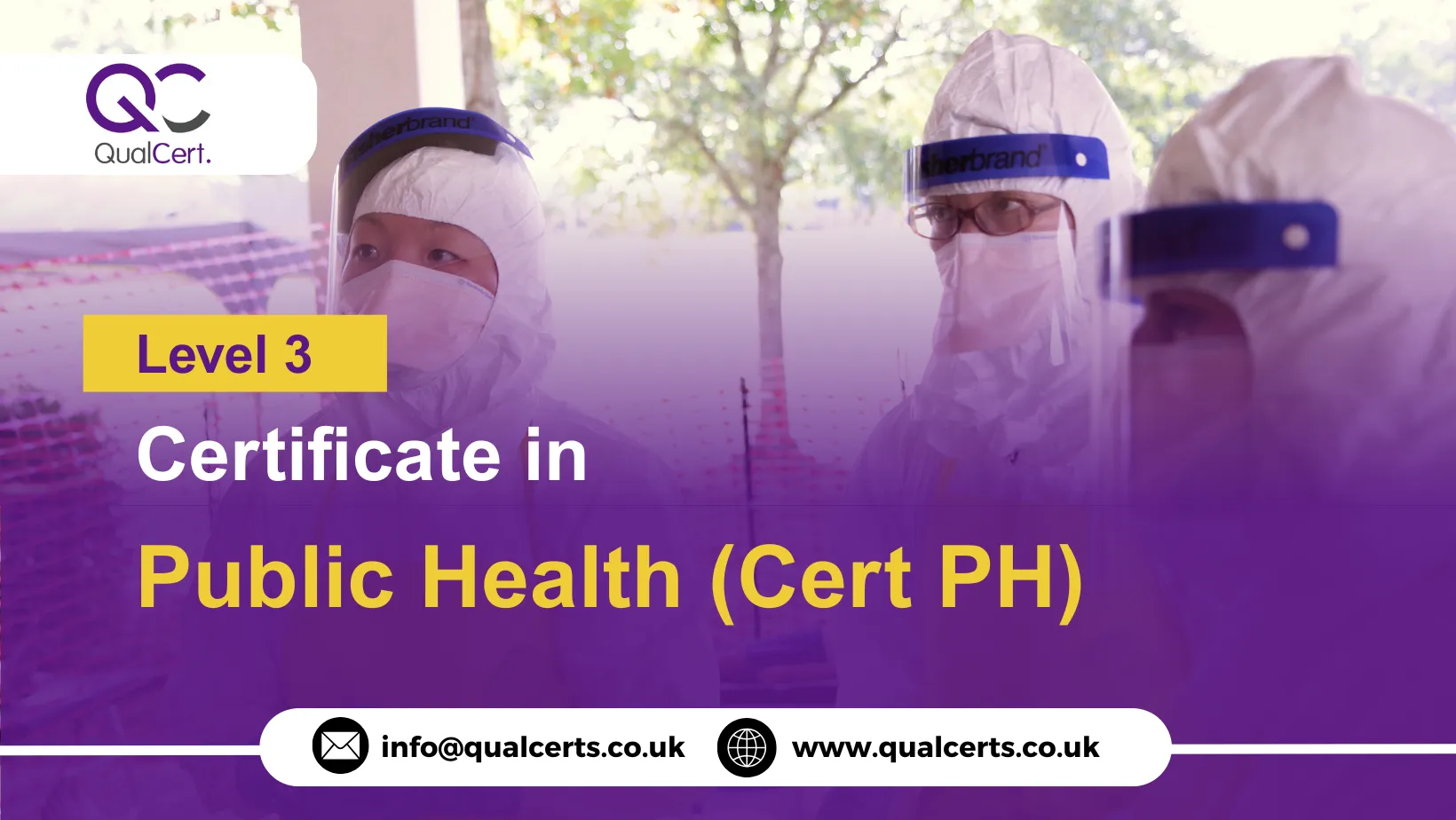The QualCert Level 3 Certificate in Public Health (Cert PH) is a specialised qualification designed to equip learners with the essential knowledge and skills required to understand and address public health challenges. This programme provides a strong foundation in the principles of public health, disease prevention, health promotion, and community wellbeing, preparing learners for both professional development and further study in the healthcare sector.
Public health plays a critical role in improving health outcomes, reducing inequalities, and enhancing the quality of life within communities. The QualCert Level 3 Certificate in Public Health (Cert PH) introduces learners to the core concepts of epidemiology, health promotion, and healthcare systems, while also focusing on practical approaches to community engagement and public health initiatives.
Through guided learning and independent study, participants will explore the social, environmental, and behavioural factors that influence population health. This certificate highlights the importance of preventative care and provides insights into current public health issues at local, national, and global levels.
Upon completing the QualCert Level 3 Certificate in Public Health, learners can progress to advanced qualifications such as Level 4 Diplomas in Public Health or related healthcare fields. The knowledge gained also provides a strong foundation for roles in health education, community development, and healthcare support services.
QualCert qualifications are designed to meet international standards, ensuring learners receive a high-quality education that combines theoretical knowledge with practical application. The Level 3 Certificate in Public Health (Cert PH) offers a balanced approach to learning, equipping participants with skills that are both academically valuable and directly relevant to real-world healthcare challenges.
Course Contents of QualCert Level 3 Certificate in Public Health:
The QualCert Level 3 Certificate in Public Health, offers 20 Credits, requiring a Total Qualification Time (TQT) of 100 hours, including 70 Guided Learning Hours (GLH).
| Unit Ref# | Unit Title | Credit | GLH | TQT |
| QC27082-1 | Principles of Public Health and Epidemiology | 4 | 14 | 20 |
| QC27082-2 | Health Promotion and Disease Prevention | 4 | 14 | 20 |
| QC27082-3 | Social and Environmental Determinants of Health | 4 | 14 | 20 |
| QC27082-4 | Public Health Policy, Systems, and Governance | 4 | 14 | 20 |
| QC27082-5 | Community Engagement and Health Education | 4 | 14 | 20 |
Entry Requirements for the QualCert Level 3 Certificate in Public Health:
Minimum Age
Learners must be at least 16 years old at the time of registration.
Educational Background
A minimum of a Level 2 qualification (or equivalent) is recommended. Candidates without formal qualifications may be considered if they can demonstrate relevant knowledge or interest in public health.
Experience
No prior work experience is required. However, previous exposure to healthcare, social care, or community development environments will be beneficial.
Language Proficiency
Learners must demonstrate proficiency in English at Level 2 or equivalent to ensure they can complete written assignments, case studies, and assessments effectively.
Learning Outcomes for the QualCert Level 3 Certificate in Public Health:
Principles of Public Health and Epidemiology
- Understand the key principles and scope of public health
- Explain the role of epidemiology in monitoring and improving population health
- Identify the major causes of morbidity and mortality at local, national, and global levels
- Apply basic epidemiological methods to analyse public health data
Health Promotion and Disease Prevention
- Define the principles of health promotion and preventative healthcare
- Demonstrate knowledge of strategies for reducing risk factors and promoting healthier lifestyles
- Assess the effectiveness of health campaigns and interventions
- Apply practical approaches to supporting disease prevention in communities
Social and Environmental Determinants of Health
- Explain how social, cultural, and economic factors influence health outcomes
- Assess the role of environment and lifestyle in shaping population health
- Identify key inequalities in health and strategies to address them
- Analyse case studies on the impact of social determinants on public health
Public Health Policy, Systems, and Governance
- Understand the structure of healthcare and public health systems
- Explain the importance of policies and regulations in managing health outcomes
- Evaluate the role of government, agencies, and organisations in public health governance
- Analyse the relationship between policy, planning, and public health delivery
Community Engagement and Health Education
- Understand the importance of engaging communities in public health initiatives
- Develop strategies for effective communication and health education
- Apply principles of behavioural change in promoting healthier practices
- Evaluate community-based programmes and their impact on health outcomes
The QualCert Level 3 Certificate in Public Health (Cert PH) is designed for individuals who want to develop knowledge and skills in improving population health. This course is particularly suitable for:
- Aspiring public health professionals seeking a recognised qualification
- Community health workers and healthcare assistants aiming to enhance their expertise
- Social care and voluntary sector staff involved in health and wellbeing projects
- Individuals planning to progress into higher-level studies in public health or healthcare management
- Professionals seeking to contribute to health promotion and disease prevention within their communities
Centres delivering this qualification must:
- Be an approved and accredited training provider with QualCert
- Employ tutors, trainers, and assessors who hold relevant qualifications and practical experience in public health or healthcare
- Provide access to appropriate learning resources, including case studies, guidelines, and research materials
- Ensure facilities are suitable for learning, assessment, and community engagement activities
- Maintain robust internal quality assurance systems to uphold qualification standards
- Offer learners academic guidance, pastoral support, and fair access to assessment opportunities

